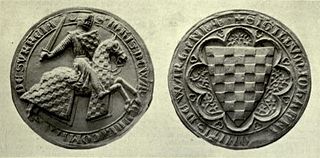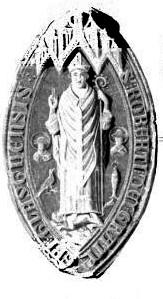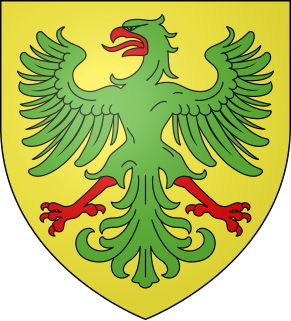Related Research Articles

The Wars of Scottish Independence were a series of military campaigns fought between the Kingdom of Scotland and the Kingdom of England in the late 13th and early 14th centuries.

The lord chancellor, formally the lord high chancellor of Great Britain, is the highest-ranking among the Great Officers of State in England in the United Kingdom, nominally outranking the prime minister. The lord chancellor is appointed by the sovereign on the advice of the prime minister. Prior to their Union into the Kingdom of Great Britain, there were separate lord chancellors for the Kingdom of England and the Kingdom of Scotland; there were lord chancellors of Ireland until 1922.

The Lord Keeper of the Great Seal of England, and later of Great Britain, was formerly an officer of the English Crown charged with physical custody of the Great Seal of England. This position evolved into that of one of the Great Officers of State.
The Lord High Chancellor of Ireland was the highest judicial office in Ireland until the establishment of the Irish Free State in 1922. From 1721 to 1801, it was also the highest political office of the Irish Parliament: the Chancellor was Speaker of the Irish House of Lords. The Lord Chancellor was also Lord Keeper of the Great Seal of Ireland. In all three respects, the office mirrored the Lord High Chancellor of Great Britain.

John de Warenne, 6th Earl of Surrey was a prominent English nobleman and military commander during the reigns of Henry III of England and Edward I of England. During the Second Barons' War he switched sides twice, ending up in support of the king, for whose capture he was present at Lewes in 1264. Warenne was later appointed a Guardian of Scotland and featured prominently in Edward I's wars in Scotland.

William Greenfield served as both the Lord Chancellor of England and the Archbishop of York. He was also known as William of Greenfield.
The Lord Chancellor of Scotland was a Great Officer of State in the Kingdom of Scotland.
Sir John de Benstede KB (c.1275 –1323/4) was a prominent member of the English royal household in the late 13th and early 14th century. He was Prebendary of Sandiacre from 3 February 1297 until, presumably, 1308, when he married. He was also King's Secretary, and he served variously as keeper of the Great Seal and controller of the wardrobe. He also served as Chancellor of the Exchequer from 1305 to 1306, and as a royal judge from 1309 onwards.

Sir Simon Fraser of Oliver and Neidpath was a Scottish knight who fought in the Wars of Scottish Independence, for which he was hanged, drawn, and quartered in 1306.

Robert Wishart was Bishop of Glasgow during the Wars of Scottish Independence and a leading supporter of Sir William Wallace and King Robert Bruce. For Wishart and many of his fellow churchmen, the freedom of Scotland and the freedom of the Scottish church were one and the same thing. His support for the national cause was to be of crucial importance at some critical times.
Events from the 1300s in England.

Ralph de Monthermer, 1st Baron Monthermer, Earl of Gloucester, Hertford, and Atholl was an English nobleman, who was the son-in-law of King Edward I. His clandestine marriage to the King's widowed daughter Joan greatly offended her father, but he was quickly persuaded to pardon Ralph.
William Ayermin was a medieval Bishop of Norwich.
Thomas de Dundee, also called Thomas Nicholay, was a Scottish prelate who held the bishopric of Ross during the First War of Scottish Independence. Coming from a family of Dundee burgesses, he was educated as the University of Bologna, before entering into career in the church.
Thomas Cantock, Quantock or Cantok was an English-born cleric and judge in medieval Ireland, who held the offices of Bishop of Emly and Lord Chancellor of Ireland.

Sir William de Monte Alto of Ferne, also known as William de Mohaut (d.1327) was a 13th-14th century Scottish noble.
Admiral Sir Gervase Alard, Bart. (1270–1340), was an English knight and naval commander who was appointed Admiral of the Cinque Ports Fleet and Admiral of the Western Fleet of the English Navy who served under King's Edward I, Edward II and Edward III of England from 1296 to 1340.
Walter de Amersham, also known as Walter de Agsmundesham was the Lord Chancellor of Scotland during the English administration in Scotland from 1296 to 1304.

Sir Hugh de Audley of Stratton Audley, Lord of Stratton Audley, was a 13th-14th century English noble. During his life he acted as Constable of Montgomery Castle, Sheriff of Shropshire, Sheriff of Staffordshire, Justice of North Wales, Keeper of Selkirk Forest, and acted as an ambassador to France. Hugh participated in the rebellion of the Thomas, 2nd Earl of Lancaster and surrendered prior to the Battle of Boroughbridge in 1322. He remained a prisoner held at Wallingford Castle until he died in 1325.

Sir Walter de Burghdon, also known as Walter de Burdon, acted as the Constable of Carstairs Castle, the Sheriff of Lanark during 1301-1303 and joint Justiciar of Galloway in 1305.
References
- Watson, Fiona (1998). Under The Hammer: Edward I and Scotland, 1286-1306. East Linton, Scotland: Tuckwell Press. ISBN 1862320209.
- People of Medieval Scotland - William de Bevercotes, chancellor